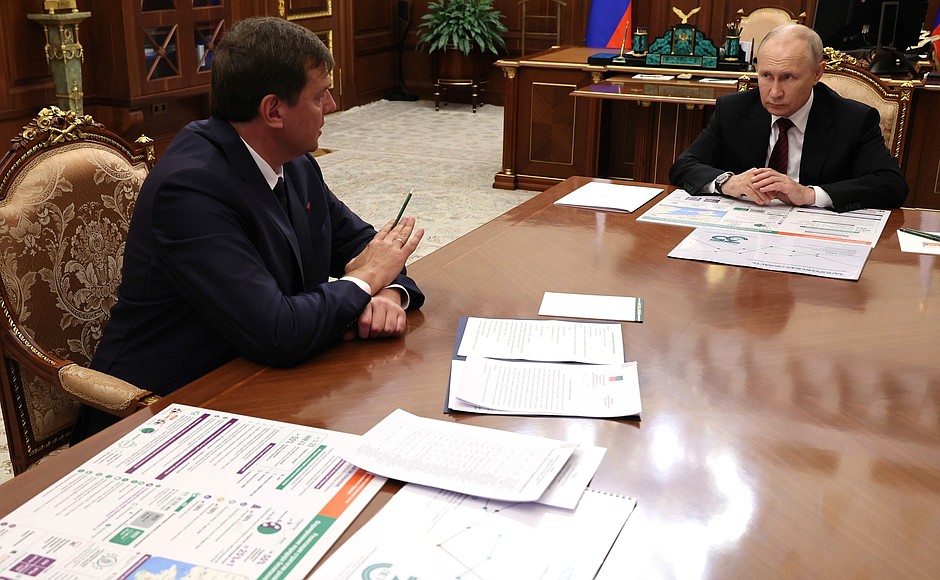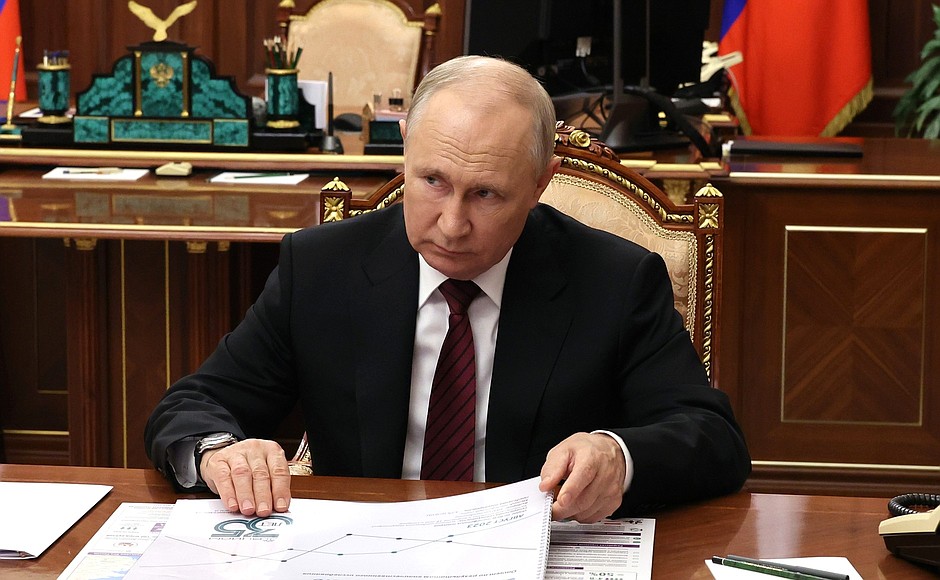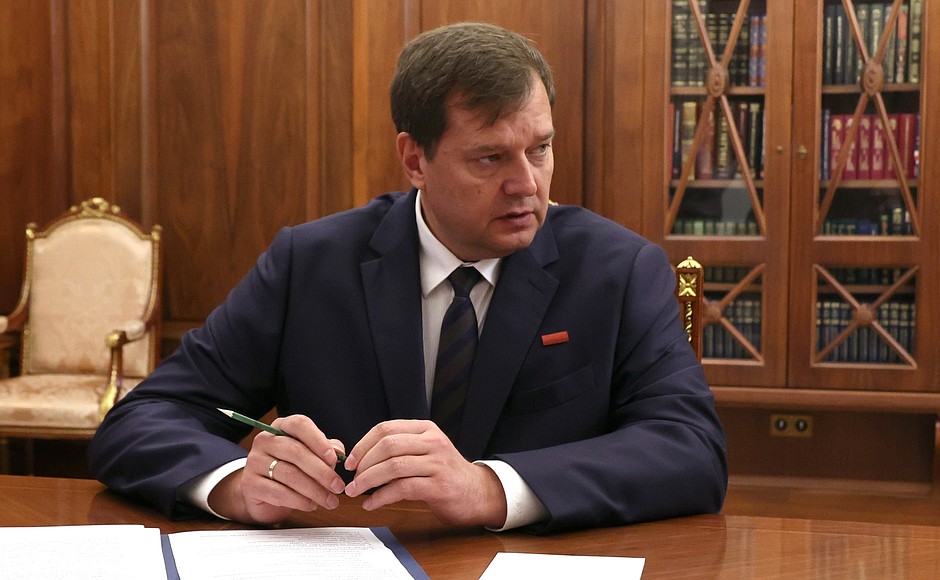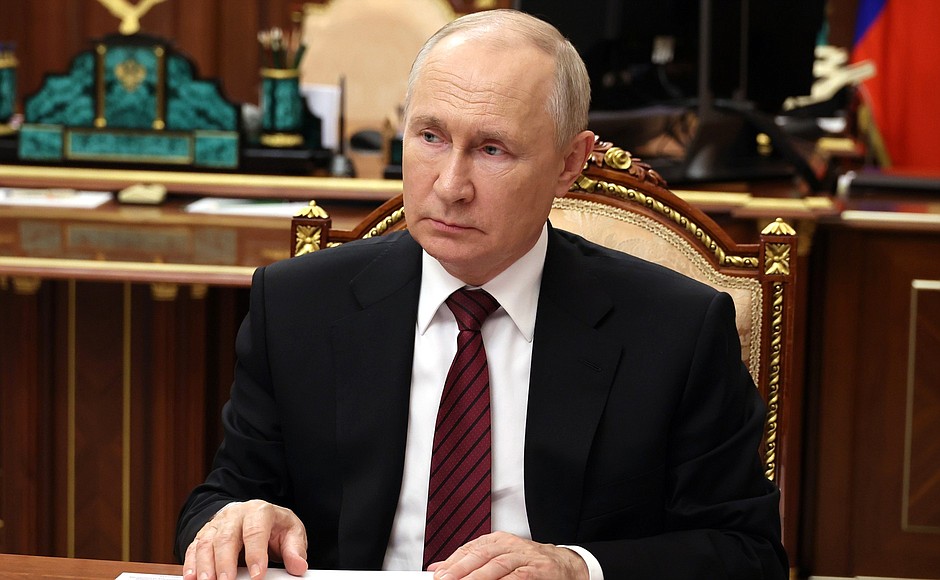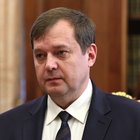President of Russia Vladimir Putin: Mr Balitsky, good evening. Where shall we start?
Acting Governor of Zaporozhye Region Yevgeny Balitsky: Mr President, first, I would like to express my deep gratitude for your initiative in early May to relocate people. This effort helped save several dozen lives because the adversary – the Nazi regime – and its accomplices continue to shell the cities located along the frontline.
Let me share just one small example with you. Parents expressed their deep gratitude and asked me to pass on their message to you. After we launched the relocation effort on May 4, in a matter of two days a school in Tokmak was hit by an artillery shell. But the children were not there anymore, so no one was hurt. For that, you have the deepest gratitude of the parents of these schoolchildren.
Mr President, I would like to say a few words about September 1, since this is a very important topic. This will be the second Knowledge Day for us since joining Russia, reuniting with our homeland. Mr Kiriyenko [First Deputy Head of the Presidential Executive Office] keeps a close eye on this situation. He visited us just the other day and we toured schools together. I can assure you that we have textbooks for all students. The schools are ready to offer the whole range of education and development opportunities along with extracurricular activities. We paid all the dues earmarked to this effect in the budget to the teachers who teach extracurricular activities. The National Guard has been licenced to provide security at all schools, and all first to fourth graders will receive free meals. I met with the teachers, and they asked me to express their deep gratitude to you.
The land route crossing the Zaporozhye Region along the Sea of Azov, which is now our internal waters, is another important item. This route is fully operational. The decision you and the Government took to rebuild this road was very wise and timely, I have to say, because today it serves us well. Of course, the Nazis continue targeting infrastructure, including the Crimean Bridge, and we understand this. Today, we are reaping the fruits of past efforts.
People cross the Zaporozhye Region with words of gratitude – I am saying this in all honesty. I cannot say for Russia as a whole since I do not travel much around the country these days, but our people have a lot of gratitude for this road. It was my duty to convey these words of gratitude to you.
And these are not just words. Since we constantly conduct sociological surveys, we hear respondents talk about what Russia is doing in their region, how this is being done, and how considerate every social agency is about their needs. These surveys highly commend our work; you can see this. Today, 87 percent of residents of the Zaporozhye Region support you as the head of the country; the United Russia party has 71 percent support. We are confident that United Russia will get a well-deserved percent of the vote reflecting the work it has been doing under your leadership.
Speaking of the elections, we have compiled a complete list of candidates for deputies of the legislative assembly. I would like to show it to you and report that we are fully prepared for the elections. Most importantly, we are prepared in terms of the actions we have been taking. We consider the work we have been doing as the underlying basis and the main goal set by you and by the Government of the Russian Federation.
I can say a few words about the strategic concept of the socio-economic development of the Zaporozhye Region. It is a long document, so I did not bring all of it here. I just wanted to go over the strategy that we are proposing and ask for your support, because this document is at the core of our election platform.
I heard your speech in Beijing on May 14, 2017, and you said something like “greater Russia is not an abstract geopolitical concept, but a civilisational project aimed at the future.” And you know, even then, in 2017, I took in the tone of your words. I understand perfectly well that the Russian world is boundless; but we have to fight for it. And many Russian politicians such as Peter I or Anna Ioannovna did that by force of arms; they took Crimea but were forced to leave. And only Catherine, thanks to her wisdom and to Potemkin, was able to create an outpost of Russia in the south by building cities there and ensuring economic sustainability.
We believe that the Zaporozhye Region should become a similar outpost, with its own advantageous geopolitical and logistical significance.
Vladimir Putin: The potential is great indeed.
Yevgeny Balitsky: It would not be enough just to protect people; the most important task is for them to stay and live there. To do this, we need to create a number of economic prerequisites, the right conditions for people to live, love each other, and have children from this love.
We took the cue from what the civilian and military administration did last year and did not go down the path of trial and error as was the case in the Donetsk and Lugansk republics. Perhaps, some mistakes were made in Crimea as well. We tried to learn as much as we could from the experience of our colleagues in these regions to avoid making the same mistakes and tried to manage the economy in the most effective manner. That way, we created state-owned enterprises. Following our belief that the state is the most important and responsible “operator” of the people's lives, we have created 20 state-run companies such as the State Grain Operator, Melitopol Railway, or the Berdyansk Commercial Sea Port, and a company that provides security guard services to schools and other sites. All of them are state bodies. Every fourth person is working in the public sector today. We believe that this is the right thing to do as long as the SMO continues. After the SMO is over, we will – maybe it is not the most popular word – proceed to denationalising the economy. So far, doing this has allowed us to preserve abandoned enterprises and to create economic potential in them, as well as to reestablish perhaps not 100 percent, but at least most of the economic potential.
We were guided primarily by social justice considerations when we were doing this. We did not want the people to have the sense that some oligarchs had fled only to be replaced by other oligarchs. That’s why we use public-private partnership arrangements to place enterprises under management and have the state keep at least 25 percent interest in them. This makes it possible for us to create additional savings that go to the Zaporozhye Region budget, the way they are doing it in Tatarstan. We used these arrangements to create a major agency that will provide financial help and create innovation-driven and education platforms that include kindergartens, schools, universities, and colleges, which will be able to develop the way we envision. That includes renovating churches and monuments.
This will allow us to create a joint-stock company “Novoye Priazovye” which we will support with state property transferred under public-private partnership arrangements. For example, if we issue a subsidy to a farmer, he will be expected to engage in what we can provide to them. Here is what it is all about. Let's say that, according to our information, the production of textiles in the Russian Federation is wanting. We can sow hemp in the Zaporozhye Region. Technical hemp makes it possible for us to sew coarse clothing, which is what we are subsidising. By the way, it is also about gunpowder. So, a planned economy gives us the opportunity to influence the situation and production. This is part of the Soviet past, and implementing it, we think, is quite a good idea.
Vladimir Putin: Fibre crops?
Yevgeny Balitsky: Yes.
I will not describe, Mr President, the entire concept, because it would take a lot of time. Please support our initiative. I have discussed it, of course, with Mr Kiriyenko and Mr Khusnullin [Deputy Prime Minister] – he has his own opinion as regards public ownership – but generally they have supported our concept, and, if you do not object, there is a letter, and we ask that you please support our construct for ministries and agencies to start working on it.
Vladimir Putin: We will support it, of course.
But, you know, I would like to hear your assessment of one pressing and important issue. I mean energy. The lack of energy resources is affecting all areas of life. What are the prospects in this regard and what kind of assistance do you need?
Yevgeny Balitsky: We had a meeting with Energy Minister Nikolai Shulginov. According to the decision taken by Marat Khusnullin’s working group, we have kept all power capacities of up to 35,000 kV for ourselves and handed everything higher over to the Ministry of Energy. We have also transferred our wind generation capacities, as well as, according to your decision, the nuclear power station and we will transfer the thermal power plant. We are keeping everything that is lower than 35,000 kV. Ours is a transit region, and when we push back the frontline, the Zaporozhye Region will get a handsome transit income. We are fully provided with electric energy. Of course, we would have coped had we kept for ourselves all the “high” capacities. I think we would have managed, given that we sustained them for one and a half years. But we will support the decision on the transfer.
Vladimir Putin: Is gas installation still a problem?
Yevgeny Balitsky: Yes, it is. Four of our districts out of 13 are yet to get gas distribution infrastructure. I mean parts of them. They are in the south – the Primorsky District and further north.
We will continue to install gas distribution infrastructure. A new pipeline was built under a Government decision, after the Nazi authorities switched off the Zaporozhye Region. The pipeline branched off from the Donbass gas system and crossed the region’s lower part. Today, this pipeline fully supplies the whole of the Zaporozhye Region, including those districts. We hope to install 100 percent of gas infrastructure within the next year.
Vladimir Putin: Excellent. This is something you should strive for. I am sure you will manage.
I see that your entire team is mobilised in the positive sense of the word. I hope that people will see and feel it, despite the difficulties that are besetting both people and your administration. After all, the economic and social situation is being stabilised. Of course, much has to be done to rebuild, but we will certainly get it done, and we will keep helping you.
Yevgeny Balitsky: Thank you.
<…>
